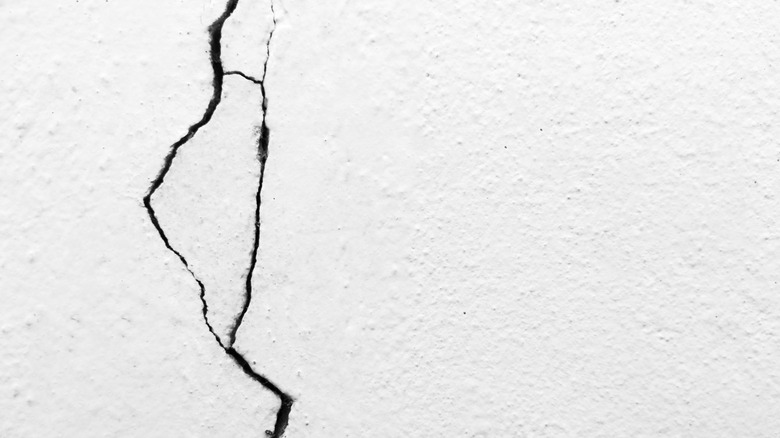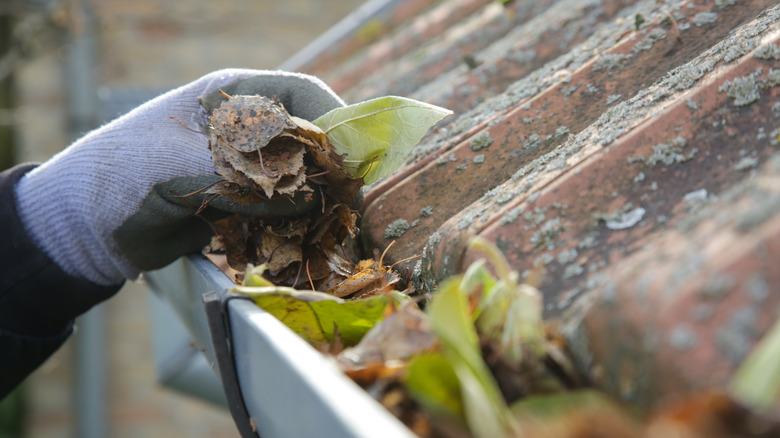The Most Important Thing For A Basement According To HGTV's Mike Holmes
We may receive a commission on purchases made from links.
Whether elegantly finished or solidly a work in progress, the basement of your home is a prime place for adding value. If the former is true, your finished basement likely adds to the livable square footage, which is both attractive to buyers and typically increases the value of your home. If the latter is true, there is space for upward mobility in the overall value of your property. The caveat there, of course, depends on the condition of your basement. HGTV's Mike Holmes shares some insightful tips on what you can do in your basement to increase the value of your home — but his number one priority might surprise you.
"I always say the most important thing you can do to your home is to protect it from the elements," the star contractor says on the HGTV Canada's website. He points to waterproofing as chief among the places to up your protection quotient. While waterproofing doesn't generally seep into the dreams of interior designers it makes sense that the construction pros, Holmes included, consider it foundational to your home — because it is, literally. Water can be a tremendously destructive force. After all, water built the Grand Canyon. And, while you may not have water damage issues to that degree from a little leak in your basement wall, it might feel like that when you get the bill for repairing problems with your foundation because even tiny water leaks will cause damage over time.
When to DIY and when to call the pros
While small cracks aren't a huge problem, if they become big cracks, they can cause lasting damage. Strong as it is, concrete is porous, making it possible for water to pass through, precipitating the slow erosion of the materials through which it enters and on which it sits (think wall studs and flooring), which, of course, compromises the integrity of your home's structure. It can also foster hidden mold or mildew issues. As if that weren't bad enough, leaked water can freeze and expand, creating even bigger cracks that can quickly — within a couple of days — become a major problem. The good news is that even if you have some water leaking into your home, you can address the situation and prevent further damage.
Ideally, after finding out where the water leak is coming from, you should solve the issue at the source. Although this can require calling in experts and might take time, if the fissures in your basement walls are small, a DIY fix might suffice. This $20, 10-pound pail of DAP Quick Plug Hydraulic & Anchoring Cement on Amazon can stymie the leak, but this is not a long-term solution. The water could continue coming in from outside and sit in your wall, building pressure behind the patch, and eroding the patch material. Dealing with leaks in your basement might not be your favorite chore, but it is of the utmost importance.
Preventing future problems
Waterproofing your basement will not only help prevent mold, mildew, rotted walls, or crumbling foundation issues, but you'll also create a more well-sealed envelope for your home and protect it from Mother Nature, which is precisely what Holmes was getting at. Any time your home is susceptible to damage from the surrounding environment, it creates a breeding ground for bigger problems later on. A well-sealed home will also deter pests and help keep your heater or air conditioner from having to compensate for exterior temperature swings. And that will likely save you money on your energy bill.
Of course, all the solutions in the world aren't worth nearly as much as preventing the problem in the first place. Make sure that you maintain the exterior of your home by cleaning out gutters, downspouts, and window wells. Pay attention to how the grading of your yard and surrounding landscape direct water (you want it running away from the house, obviously). If you tend to have moisture in your basement or other parts of the house, consider investing in more robust drainage and maintenance solutions like a sump pump or a dehumidifier. And if you still notice leaks or wet spots, it might be time to call in the pros in order to keep your basement — and your home — in its most valuable state.


